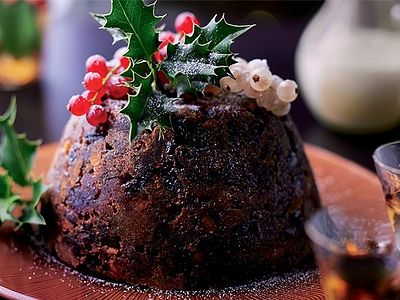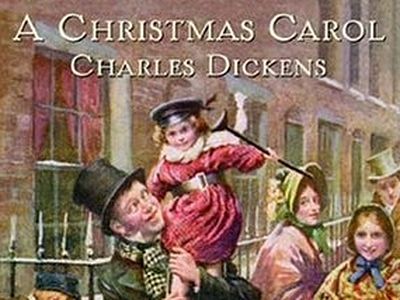In Western Christianity, Christmas has inspired more poetry, song, and prose than any other Church feast. Although in the Orthodox Church the Resurrection of Christ is the central celebration of the year, the Nativity of Our Lord Jesus Christ in the flesh is also celebrated with great solemnity. In Russia, Serbia, Jerusalem, and on Mount Athos, the faithful continue to celebrate the Nativity according to the Julian calendar, and therefore we are still in the Nativity fast. But many of our Orthodox brothers and sisters are celebrating today, and through these poems, we wish them all a blessed Christmas.
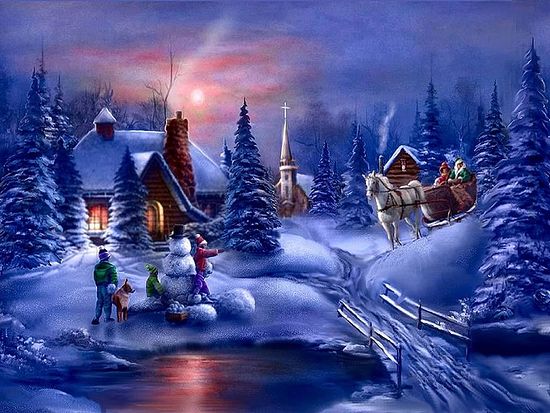
A Hymn on the Nativity of My Savior
by Ben Jonson (1572-1637)
I sing the birth was born tonight,
The Author both of life and light;
The angels so did sound it,
And like the ravished shepherds said,
Who saw the light, and were afraid,
Yet searched, and true they found it.
The Son of God, the eternal King,
That did us all salvation bring,
And freed the soul from danger;
He whom the whole world could not take,
The Word, which heaven and earth did make,
Was now laid in a manger.
The Father's wisdom willed it so,
The Son's obedience knew no "No,"
Both wills were in one stature;
And as that wisdom had decreed,
The Word was now made Flesh indeed,
And took on Him our nature.
What comfort by Him do we win?
Who made Himself the Prince of sin,
To make us heirs of glory?
To see this Babe, all innocence,
A Martyr born in our defense,
Can man forget this story?
The Three Kings
by Henry Wadsworth Longfellow
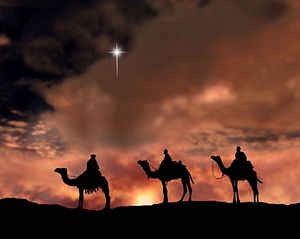
Melchior and Gaspar and Baltasar;
Three Wise Men out of the East were they,
And they travelled by night and they slept by day,
For their guide was a beautiful, wonderful star.
The star was so beautiful, large and clear,
That all the other stars of the sky
Became a white mist in the atmosphere,
And by this they knew that the coming was near
Of the Prince foretold in the prophecy.
Three caskets they bore on their saddle-bows,
Three caskets of gold with golden keys;
Their robes were of crimson silk with rows
Of bells and pomegranates and furbelows,
Their turbans like blossoming almond-trees.
And so the Three Kings rode into the West,
Through the dusk of the night, over hill and dell,
And sometimes they nodded with beard on breast,
And sometimes talked, as they paused to rest,
With the people they met at some wayside well.
"Of the child that is born," said
Baltasar,
"Good people, I pray you, tell us the news;
For we in the East have seen his star,
And have ridden fast, and have ridden far,
To find and worship the King of the Jews."
And the people answered, "You ask in vain;
We know of no King but Herod the Great!"
They thought the Wise Men were men insane,
As they spurred their horses across the plain,
Like riders in haste, who cannot wait.
And when they came to Jerusalem,
Herod the Great, who had heard this thing,
Sent for the Wise Men and questioned them;
And said, "Go down unto Bethlehem,
And bring me tidings of this new king."
So they rode away; and the star stood still,
The only one in the grey of morn;
Yes, it stopped --it stood still of its own free
will,
Right over Bethlehem on the hill,
The city of David, where Christ was born.
And the Three Kings rode through the gate and the
guard,
Through the silent street, till their horses turned
And neighed as they entered the great inn-yard;
But the windows were closed, and the doors were
barred,
And only a light in the stable burned.
And cradled there in the scented hay,
In the air made sweet by the breath of kine,
The little child in the manger lay,
The child, that would be king one day
Of a kingdom not human, but divine.
His mother Mary of Nazareth
Sat watching beside his place of rest,
Watching the even flow of his breath,
For the joy of life and the terror of death
Were mingled together in her breast.
They laid their offerings at his feet:
The gold was their tribute to a King,
The frankincense, with its odor sweet,
Was for the Priest, the Paraclete,
The myrrh for the body's burying.
And the mother wondered and bowed her head,
And sat as still as a statue of stone,
Her heart was troubled yet comforted,
Remembering what the Angel had said
Of an endless reign and of David's throne.
Then the Kings rode out of the city gate,
With a clatter of hoofs in proud array;
But they went not back to Herod the Great,
For they knew his malice and feared his hate,
And returned to their homes by another way.
Christmas Bells
by Henry Wadsworth Longfellow
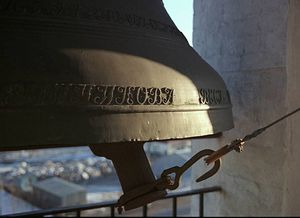
Their old, familiar carols play,
And wild and sweet
The words repeat
Of peace on earth, good-will to men!
And thought how, as the day had come,
The belfries of all Christendom
Had rolled along
The unbroken song
Of peace on earth, good-will to men!
Till, ringing, singing on its way
The world revolved from night to day,
A voice, a chime,
A chant sublime
Of peace on earth, good-will to men!
Then from each black, accursed mouth
The cannon thundered in the South,
And with the sound
The Carols drowned
Of peace on earth, good-will to men!
And in despair I bowed my head;
‘There is no peace on earth,’ I said;
‘For hate is strong,
And mocks the song
Of peace on earth, good-will to men!’
Then pealed the bells more loud and deep:
‘God is not dead; nor doth he sleep!
The Wrong shall fail,
The Right prevail,
With peace on earth, good-will to men!’
In the Bleak Midwinter
By Christina Rossetti (written 1872, published
posthumously in 1904)
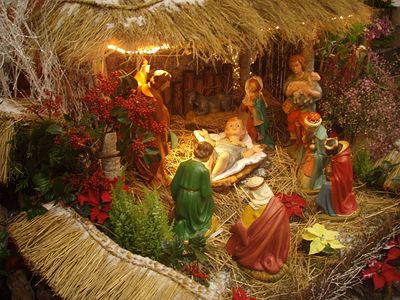
In the bleak mid-winter
Frosty wind made moan,
Earth stood hard as iron,
Water like a stone;
Snow had fallen, snow on snow,
Snow on snow,
In the bleak mid-winter
Long ago.
Our God, Heaven cannot hold Him
Nor earth sustain;
Heaven and earth shall flee away
When He comes to reign:
In the bleak mid-winter
A stable-place sufficed
The Lord God Almighty,
Jesus Christ.
Enough for Him, whom cherubim
Worship night and day,
A breastful of milk
And a mangerful of hay;
Enough for Him, whom angels
Fall down before,
The ox and ass and camel
Which adore.
Angels and archangels
May have gathered there,
Cherubim and seraphim
Thronged the air,
But only His mother
In her maiden bliss,
Worshipped the Beloved
With a kiss.
What can I give Him,
Poor as I am?
If I were a shepherd
I would bring a lamb,
If I were a wise man
I would do my part,
Yet what I can I give Him,
Give my heart.
Not Only Christmas Day
By Mary Fairchild
Lord, this is my prayer
Not only on Christmas Day
But until I see You face to face
May I live my life this way:
Just like the baby Jesus
I ever hope to be,
Resting in Your loving arms
Trusting in Your sovereignty.
And like the growing Christ child
In wisdom daily learning,
May I ever seek to know You
With my mind and spirit yearning.
Like the Son so faithful
Let me follow in Your light,
Meek and bold, humble and strong
Not afraid to face the night.
Nor cowardly to suffer
And stand for truth alone,
Knowing that Your kingdom
Awaits my going home.
Not afraid to sacrifice
Though great may be the cost,
Mindful how You rescued me
From broken-hearted loss.
Like my risen Savior
The babe, the child, the Son,
May my life forever speak
Of who You are and all You've done.
So while this world rejoices
And celebrates Your birth,
I treasure You, the greatest gift
Unequaled in Your worth.
I long to hear the same words
That welcomed home Your Son,
"Come, good and faithful servant,"
Your Master says, "Well done."
And may heaven welcome others
Who will join with me in praise
Because I lived for Jesus Christ
Not only Christmas Day
A Christmas Lesson
by Tom Krause, © 2003, www.coachkrause.com
"Is there a purpose? Why are we here?"
A little boy asked as the yuletide drew near.
"I really do hope that someday I will know
The reason we stand out here in the snow,
Ringing this bell as people walk by
While snowflakes descend from out of the sky."
The mother just smiled at her shivering son
Who would rather be playing and having some fun,
But soon would discover before evening was done
The meaning of Christmas, the very first one.
The young boy exclaimed, "Mother, where do they
go,
All the pennies we collect every year in the snow?
Why do we do it? Why do we care?
We work for these pennies, so why should we share?"
"Because once a small baby, so meek and so mild
Was born in a manger," She said to the child.
"The Son of a King was born in this way,
To give us the message He carried that day."
"You mean Baby Jesus? Is He why we're here,
Ringing this bell at Christmas time every
year?"
"Yes," said the mother. "That is why you
should know
About the very first Christmas a long time ago."
"The present God gave to the world on that
night
Was the gift of His Son to make everything right.
Why did He do it? Why did He care?
To teach about loving and how we should share."
"The meaning of Christmas, you see, my dear
son,
Is not about presents and just having fun.
But the gift of a Father—His own precious
Son—
So the world would be saved when His work was all
done."
Now the little boy smiled with a tear in his eye,
As snowflakes kept falling from out of the
sky—
Rang louder the bell as the people walked by
While down deep in his heart at last he knew why.
Good King Wenceslas
by John Mason Neale
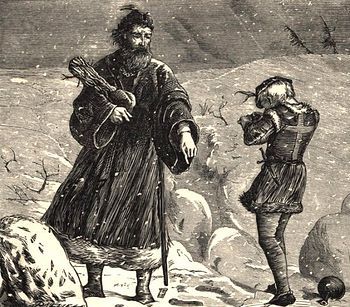
On the feast of Stephen
When the snow lay round about
Deep and crisp and even
Brightly shone the moon that night
Though the frost was cruel
When a poor man came in sight
Gath'ring winter fuel
"Hither, page, and stand by me
If thou know'st it, telling
Yonder peasant, who is he?
Where and what his dwelling?"
"Sire, he lives a good league hence
Underneath the mountain
Right against the forest fence
By Saint Agnes' fountain."
"Bring me flesh and bring me wine
Bring me pine logs hither
Thou and I will see him dine
When we bear him thither."
Page and monarch forth they went
Forth they went together
Through the rude wind's wild lament
And the bitter weather
"Sire, the night is darker now
And the wind blows stronger
Fails my heart, I know not how,
I can go no longer."
"Mark my footsteps, my good page
Tread thou in them boldly
Thou shalt find the winter's rage
Freeze thy blood less coldly."
In his master's steps he trod
Where the snow lay dinted
Heat was in the very sod
Which the Saint had printed
Therefore, Christian men, be sure
Wealth or rank possessing
Ye who now will bless the poor
Shall yourselves find blessing
Marmion a Christmas Poem
by Sir Walter Scott
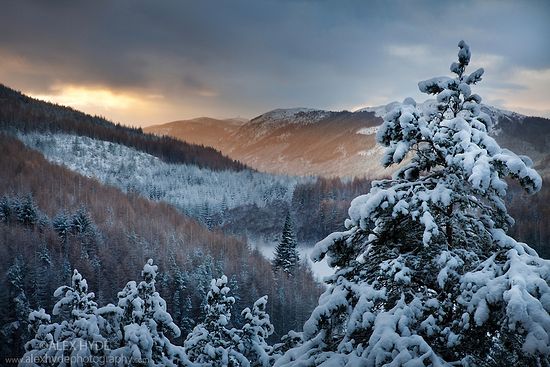
Heap on more wood!—the wind is chill;
But let it whistle as it will,
We’ll keep our Christmas merry still.
Each age has deem’d the new-born year
The fittest time for festal cheer:
Even, heathen yet, the savage Dane
At Iol more deep the mead did drain;
High on the beach his galleys drew,
And feasted all his pirate crew;
Then in his low and pine-built hall
Where shields and axes deck’d the wall
They gorged upon the half-dress’d steer;
Caroused in seas of sable beer;
While round, in brutal jest, were thrown
The half-gnaw’d rib, and marrow-bone:
Or listen’d all, in grim delight,
While Scalds yell’d out the joys of fight.
Then forth, in frenzy, would they hie,
While wildly loose their red locks fly,
And dancing round the blazing pile,
They make such barbarous mirth the while,
As best might to the mind recall
The boisterous joys of Odin’s hall.
And well our Christian sires of old
Loved when the year its course had roll’d,
And brought blithe Christmas back again,
With all his hospitable train.
Domestic and religious rite
Gave honour to the holy night;
On Christmas Eve the bells were rung;
On Christmas Eve the mass was sung:
That only night in all the year,
Saw the stoled priest the chalice rear.
The damsel donn’d her kirtle sheen;
The hall was dress’d with holly green;
Forth to the wood did merry-men go,
To gather in the mistletoe.
Then open’d wide the Baron’s hall
To vassal, tenant, serf and all;
Power laid his rod of rule aside
And Ceremony doff’d his pride.
The heir, with roses in his shoes,
That night might village partner choose;
The Lord, underogating, share
The vulgar game of ‘post and pair’.
All hail’d, with uncontroll’d delight,
And general voice, the happy night,
That to the cottage, as the crown,
Brought tidings of salvation down.
The fire, with well-dried logs supplied,
Went roaring up the chimney wide;
The huge hall-table’s oaken face,
Scrubb’d till it shone, the day to grace,
Bore then upon its massive board
No mark to part the squire and lord.
Then was brought in the lusty brawn,
By old blue-coated serving-man;
Then the grim boar’s head frown’d on
high,
Crested with bays and rosemary.
Well can the green-garb’d ranger tell,
How, when, and where, the monster fell;
What dogs before his death to tore,
And all the baiting of the boar.
The wassel round, in good brown bowls,
Garnish’d with ribbons, blithely trowls.
There the huge sirloin reek'd; hard by
Plum-porridge stood, and Christmas pie;
Nor fail’d old Scotland to produce,
At such high tide, her savoury goose.
Then came the merry makers in,
And carols roar’d with blithesome din;
If unmelodious was the song,
It was a hearty note, and strong.
Who lists may in their mumming see
Traces of ancient mystery;
White shirts supplied the masquerade,
And smutted cheeks the visors made;
But, O! what maskers, richly dight,
Can boast of bosoms half so light!
England was merry England, when
Old Christmas brought his sports again.
‘Twas Christmas broach’d the mightiest
ale;
‘Twas Christmas told the merriest tale;
A Christmas gambol oft could cheer
The poor man’s heart through half the year.

